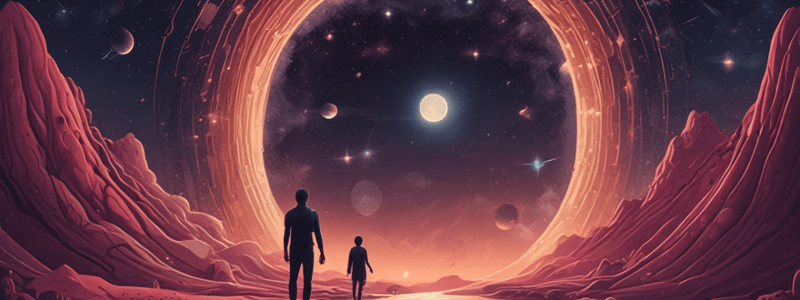Podcast
Questions and Answers
What is the Big Bang theory used to explain?
What is the Big Bang theory used to explain?
- The structure of atoms
- The life cycle of stars
- How stars and galaxies form
- How the universe came into being (correct)
How long ago did the Big Bang occur?
How long ago did the Big Bang occur?
- 10.7 billion years ago
- 15.7 billion years ago
- 17.7 billion years ago
- 13.7 billion years ago (correct)
What was the universe like in its earliest stages?
What was the universe like in its earliest stages?
- A collection of stars and galaxies
- A vast, empty space
- A small, hot, super-massive, and super-dense ball (correct)
- A huge, cold cloud of gas
What formed from groups of stars a billion years after the Big Bang?
What formed from groups of stars a billion years after the Big Bang?
What happened three minutes after the Big Bang?
What happened three minutes after the Big Bang?
What were the two simplest elements in existence after the universe took shape?
What were the two simplest elements in existence after the universe took shape?
What happened five hundred thousand years after the Big Bang?
What happened five hundred thousand years after the Big Bang?
What happens three billion years after the Big Bang?
What happens three billion years after the Big Bang?
What is a common result of galaxy mergers?
What is a common result of galaxy mergers?
What are the explosions that distribute elements into space?
What are the explosions that distribute elements into space?
What will happen to the Milky Way galaxy in three billion years?
What will happen to the Milky Way galaxy in three billion years?
What will be the fate of most galaxies 100 billion years from now?
What will be the fate of most galaxies 100 billion years from now?
How long ago was our sun born?
How long ago was our sun born?
What is the shape of some galaxies?
What is the shape of some galaxies?
What is the ultimate fate of our Earth and sun?
What is the ultimate fate of our Earth and sun?
Flashcards are hidden until you start studying
Study Notes
The Big Bang Theory
- The Big Bang theory explains how the universe came into being, describing its early development.
- The universe started as a hot, super-massive, and super-dense ball, containing everything that exists today.
- About 13.7 billion years ago, the Big Bang occurred, causing a violent explosion that hurled the material in all directions of space.
Universe Expansion and Cooling
- The universe expanded quickly after the Big Bang and continues to expand today.
- As the universe expanded and cooled, particles, neutrons, protons, atoms, stars, and galaxies formed.
Timeline of Universe Development
- One second after the Big Bang, the universe expanded, and particles formed, including neutrons, protons, and electrons.
- Three minutes later, the universe took shape, with protons and neutrons combining to form elements, primarily helium and hydrogen.
- Five hundred thousand years after the Big Bang, the universe was a huge, hot cloud of gas starting to cool.
Galaxy Formation and Evolution
- One billion years after the Big Bang, stars and galaxies formed, with gravity exerting its force.
- Three billion years after the Big Bang, smaller galaxies merged into larger ones, shaped like spirals or spheres.
- Six billion years after the Big Bang, stars were born and died, distributing common elements into space through supernovas.
Black Holes and the Future
- The violent merging of galaxies can create black holes.
- Five billion years ago, our sun was born, and the Milky Way galaxy formed.
- In three billion years, our Milky Way will merge with Andromeda.
- In 100 billion years, a few galaxies will survive, but most will have flown apart, with Earth and the sun long extinct.
Studying That Suits You
Use AI to generate personalized quizzes and flashcards to suit your learning preferences.




